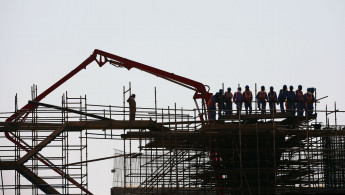Oman rejects austerity culture with mass job creation
Oman will find 33,000 managerial posts for its citizens in the coming months, as the sultanate continues to struggle with low oil prices squeezing the government's budget.
Although there are just over two million Omanis and about as many expatriates in the Gulf state, the country's "job creation" scheme may not be quite what it seems - and there will inevitably be those losing out from the government's decision.
"If implemented properly, 33,000 new managerial jobs will be created for Omanis in small companies in the sectors which either have a low Omanisation rate or are not following Omanisation policies," Shahswar al-Balushi, chief executive officer of the Oman Society of Contractors told local daily the Times of Oman.
This ultimately means that expatriates will have to make way for locals, as new construction contracts will be given to companies with an Omani management structure.
However, there are fears that there will be layoffs in the construction sector as the Omani government considers freezing or slowing down some of its expensive infrastructure projects.
Just a few weeks ago, Balushi said that 55,000 Omanis could lose their jobs in the construction sector due to low oil prices, the Times of Oman reported.
"These jobs will be created at smaller companies, which are not connected to government projects and are not linked with oil price fluctuations," Balushi said on Monday.
Oman has enjoyed a massive construction boom over the past decade, when oil prices were high and building experts from across the world were attracted to the southern Arabian nation.
This included road, port and air projects for the once-isolated Gulf state, along with new homes for Oman's rapidly booming population and hotels it hoped would diversify the economy.
But after a year of low oil prices many of these goals appear to be unmet, and almost 80 percent of the sultanate's finances still come from oil and gas revenues.
In 2015, Oman is predicting a $2.8 billion deficit and its lower house of parliament has suggested higher taxes for business to make up the shortfall.
Many Omanis have been worried that cash-strapped businesses and the public sector might have to cut jobs, although the government appears adamant to prevent losses.
Muscat has tried to create new jobs for Omanis through a policy of Omanisation, which means giving priorities to locals in new jobs and eventually replacing expatriate workers.
One obvious target is the construction sector, which is staffed predominantly by expatriate workers.
The Times of Oman said that more than 92 percent of workers are foreign, however many of these positions are low-paid, labour intensive building jobs, which Omanis would unlikely find attractive.
Building companies have also said that the new regulations would make Oman a less attractive place from which to operate, given the constraints they now have on finding the right workers, and the fewer contracts available.





 Follow the Middle East's top stories in English at The New Arab on Google News
Follow the Middle East's top stories in English at The New Arab on Google News
![Israeli forces ordered bombed Gaza's Jabalia, ordering residents to leave [Getty]](/sites/default/files/styles/image_330x185/public/2176418030.jpeg?h=a5f2f23a&itok=_YGZaP1z)

